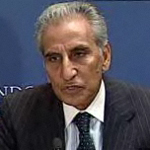{
"authors": [
"Ashley J. Tellis",
"Tariq Fatemi"
],
"type": "event",
"centerAffiliationAll": "dc",
"centers": [
"Carnegie Endowment for International Peace"
],
"collections": [],
"englishNewsletterAll": "",
"nonEnglishNewsletterAll": "",
"primaryCenter": "Carnegie Endowment for International Peace",
"programAffiliation": "SAP",
"programs": [
"South Asia"
],
"projects": [],
"regions": [
"North America",
"United States",
"South Asia",
"India",
"Afghanistan",
"Pakistan"
],
"topics": [
"Economy",
"Security",
"Military",
"Foreign Policy"
]
}
The Dangers in Pakistan: Can They Be Overcome?
Tue, May 26th, 2009
Washington, D.C.
IMGXYZ1254IMGZYX A national consensus on fighting militants, stable relations with India, and a trust-based relationship with the United States are necessary for Pakistan to successfully confront extremism, said Ambassador Tariq Fatemi, senior foreign policy advisor to Nawaz Sharif, chairman of the Pakistan Muslim League. In a meeting moderated by Ashley J. Tellis, Fatemi discussed the domestic, regional, and international challenges Pakistan is facing, and its prospects for success.
National Consensus to Fight Militants
Ambassador Fatemi emphasized that policies based on consensus are more legitimate, credible, and effective. The democratically elected Pakistani government needs to foster a national consensus in favor of fighting militants by including other political parties and drawing on Pakistan’s vibrant press, vocal civil society, and influential religious leaders.
The Pakistani government must also invest in the people of Pakistan to prevent them from becoming alienated and susceptible to extremists. Throughout its history, Pakistan has made massive allocations to its defense sector at the cost of allocations for health, education and the social sector. Even in the Musharraf years, when Pakistan grew rapidly, the government spent only 2.5 percent of GDP on health and education, while similarly growing countries spent 7 percent. Pakistan needs to reverse this practice to prevent extremists from taking advantage of government neglect.
Pakistan must also grant greater provincial autonomy to smaller provinces, which resent Punjab’s domination of the state and army. The growing resentment and polarization prevents the formulation of truly national solutions to domestic problems.
Stabilize India Relations, Abandon “Strategic Depth” in Afghanistan
Ambassador Fatemi explained that Pakistan’s unwillingness to move troops from the Indian border is still justifiable given that India threatened war on Pakistan twice in the last decade. Advocating a resumption of the Composite Dialogue Process with India—halted after the Mumbai attacks—he called for resolution of long-standing differences between the two countries. The United States can play a key role in convincing India to work on resolving the Kashmir issue, thus reducing tensions between the two countries.
Pakistan must also abandon its “strategic depth” doctrine in Afghanistan and learn to treat it as an independent, sovereign country. The United States can help by pressuring Kabul to formally accept the Durand line as the border between Pakistan and Afghanistan.
Absence of Trust in the Pakistan-U.S. Relationship
Fatemi emphasized that the Pakistan-U.S. relationship must be based on trust for their cooperation against terrorism to be effective. The use of drones illustrates the lack of trust, reinforces anti-American sentiments, and weakens Pakistan’s credibility. Joint operation of the drones would reduce the negative fallout. Additionally, the attachment of onerous and impractical conditions to U.S. aid—like preventing a terrorist attack on India—is unproductive: they cannot be guaranteed and only humiliate Pakistan.
Pakistan should make it clear to the United States that it prefers economic assistance to military assistance. Measures like greater market access for Pakistan’s exports would have a deeper impact on Pakistan’s economy than cash handouts, which encourage corruption. Also, the Pakistan government must also ensure that forthcoming U.S. aid is spent on programs that bring visible improvements in daily life to combat anti-Americanism.
Reasons for Optimism
Concluding his presentation, Ambassador Fatemi outlined recent trends in Pakistan which signal the government's ability to sustain its offensive against extremists.
- Opposition parties have shown maturity and responsibility in supporting the government on national security issues, rather than simply opposing and seeking to embarrass it.
- There is a growing consensus in Pakistan that good relations with India are necessary to devote resources to economic development instead of military expenditures.
- The Taliban’s crude and cruel tactics have exposed their true agenda and alienated large sections of the urban population, while strengthening moderate sentiments in the country.
In the question and answer session, Fatemi criticized the Pakistan government for not anticipating the humanitarian costs of its Swat offensive, which has resulted in the displacement of 2 million people.
Carnegie does not take institutional positions on public policy issues; the views represented herein are those of the author(s) and do not necessarily reflect the views of Carnegie, its staff, or its trustees.
Event Speakers
Ashley J. Tellis
Former Senior Fellow
Ashley J. Tellis was a senior fellow at the Carnegie Endowment for International Peace.
Tariq Fatemi